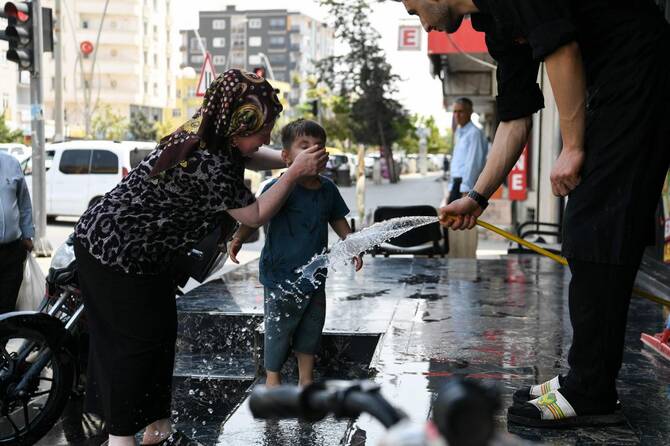
- ARAB NEWS
- 01 Aug 2025

SILOPI, Turkiye: A choking heatwave left astonished locals in southeastern Turkiye calling for state help to pay their air conditioning bills after the temperature surged past 50C.
“We cannot cope with the heat,” ice-cream maker Recep Esiyok, 59, told AFP in Silopi, where meteorologists measured 50.5C on Friday — a national record.
“I’ve been living in Silopi for about 30 years. I’ve never seen such heat… I’ve never seen such heat anywhere.”
He is getting through the heatwave thanks to the air conditioner in his shop, but is now worried about paying for the electricity.
“My bill last month was 59,000 lira (1,450 dollars). We are asking for state support on this issue.”
Before Friday’s record, the previous peak in Turkiye had been 49.5C in August 2023.
Scientists agree that climate change caused by humans burning fossil fuels is increasing the likelihood, length and intensity of heatwaves.
“The heat has reached a point where it’s incomparable to previous years,” said Halil Coskun, 52, a local reporter.
The country is still in the grip of the heatwave and since Sunday temperatures overall have surged from six to 12 degrees above seasonal norms, according to the state meteorology directorate.
Turkiye has fought fires in several regions since the start of the summer.
Last week, 10 people perished while fighting a fire in Eskisehir province.
President Recep Tayyip Erdogan said on Monday the country has experienced drier conditions than normal over the past five years as a result of global warming.
“Extreme heat, low humidity, and strong winds are unfortunately increasing the risk of fire,” he said.
He said the state was using drones to monitor and protect forests.
The streets were relatively empty and the atmosphere tense in Silopi, a Kurdish city whose main income is trade with Iraq across the border 10 kilometers (six miles) away.
“When it’s hot, there’s no one outside during the day,” said Esiyok.
Other locals complained at the lack of vegetation to provide relief around the town, which lies at the foot of a mountain.
“Unfortunately, the forests here were burned in the past for security reasons,” said Coskun.
He said the Turkish army cleared them in the search for fighters from the Kurdistan Workers’ Party (PKK), a rebel group that recently disarmed.
Turkiye’s parliament this month also passed a bill that opens certain agricultural lands including olive groves to mining activities, despite widespread opposition.
“We could at least minimize the heat by planting trees, not by felling them,” Coskun said.
Sweating in his kebab shop, another local, Cemil Seher, said that summers in Silopi last not three months, but five.
For Seher, 51, air conditioning is no longer a luxury but a necessity.
“AC is essential here as much as bread and water,” he said.
“When the air conditioners are running, the electricity bills are very high,” he said, demanding authorities offer discounts for businesses.
“I want a discount not only for Silopi but for the entire region from here to Sanliurfa” in the east, he said.
“I am not making a profit because I’ve been working… to pay my electricity bill.”
AFP